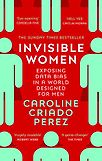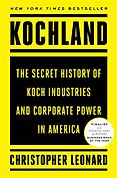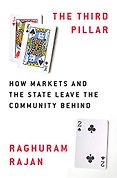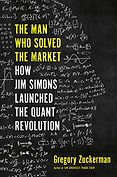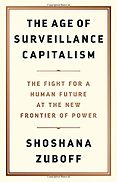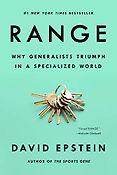The Financial Times has been selecting the best business book of the year for 15 years now, first with the backing of Goldman Sachs and now McKinsey. You’ve been involved in organizing it from the start: how does the 2019 shortlist compare to previous years?
It’s been a good year. We normally get well over 400 titles submitted now, so we’re pretty certain that we get a fair selection of the books that are out there. At the first stage, the test is always to find a longlist that has sufficient range so we get a selection of the books that are in the market: so, for example, not all economics books or all management books and not all biography. Then, in the second phase, where the judges select the shortlist of six (it’s always six books), to ensure we’ve got not only the best six, but six that are reasonably representative.
This is a good year for range—there’s actually a book called Range on the list, appropriately enough—and it’s a good year for quality. When you get down to the final six, it would be rare to have a book that wasn’t up to scratch. It’s six out of 450 out of the many thousands of business books that are published in any one year. We’re usually pretty sure that we’ve got a good reading list. And that’s the point of the prize, to ensure that busy people, readers of the Financial Times, or clients at McKinsey which sponsors the prize, have the books that they might like chosen for them, out of all the possible books that they could read in any one year.
Yes, I was wondering what counts as a business book. Is it just an interesting book for a Financial Times reader?
The criterion for winning is that it should be the most compelling and enjoyable book of the year that offers insights into business. Over the years since 2005, the business book award has taken a very broad view of what constitutes a business book. So it’s not just what you might find on the business bookshelf in your local bookstore. It goes as wide as economic history and biography and we’ve even had a couple of novels on the list in the past. That has helped to make it a more interesting book award. I don’t want to say anything nasty about business books, but it has certainly made it a broader book award than we might have guessed it would be when we first launched it in 2005.
If I can be rude about business books, a lot of rubbish does seem to get published. It’s those books with catchy titles that seem to be more self-help, but you aren’t really sure that what they’re arguing is at all substantiated.
There is a self-help category and those business books are enormous bestsellers. That’s one of the contradictions, that those bestselling books often struggle to make it onto our list. They have not performed well when it comes to our selection over the years. Then there are business books submitted that are more like textbooks. Some management academics like to put their lectures between hard covers. Those books don’t do that well either.
“Over the years since 2005, the business book award has taken a very broad view of what constitutes a business book.”
The books that do do well (and actually Range by David Epstein, on this year’s shortlist, is a good example) are books that take a look at research that is of value to businesses—in this case showing how generalists may perform better in certain complex and uncertain circumstances than specialists—and package them in an attractive, well-written way for the average business reader.
Let’s go through each of the business books that have made the cut in 2019. I’ll go through them in the order they appear on the photo of the shortlist announcement. First up is Kochland by Christopher Leonard. So tell me about this book and why it’s a good read.
Leonard’s book is the story of Koch Industries, which is the little known and rather secretive private conglomerate owned by the Koch family. It’s had a big influence as a business, but the Koch brothers, who own it, have also had a lot of political influence.
Christopher Leonard, the author, is a journalist and one of the most interesting things about the book for me is that he gets you inside a business that is notoriously secretive. He does an incredible job of painting the picture of how Koch Industries was born and how it developed.
Also, as the FT’s management editor, I find the book very interesting on the methods that Koch Industries use. They have their own internal management process to keep themselves consistent and keep standards up.
The book also shows how Koch Industries exerted its power in the US during successive administrations on how certain things, like climate change, were regulated and governed.
I’ve been listening to Kochland as an audiobook, and it’s very compelling. The opening scene is almost like a James Bond movie, you’re kind of waiting for something dreadful to happen.
It has got that sense of a thriller, as Leonard digs deeper into what Koch Industries is doing.
I was also fascinated by the part where they’re trying to break the union at the refinery, and understanding how that was done day-to-day. I thought that was very powerful.
Yes, Leonard illustrates the book with compelling stories about the way in which Koch Industries has operated across a whole range of different sectors. He does a good job.
As a side note, we did actually have another book about Koch Industries, Sons of Wichita, on the longlist of the prize a few years ago. That was also about the Koch brothers, one of whom died recently. So this book is, weirdly, the second book about Koch Industries that has featured on the business book award longlist.
The next book on the 2019 business book of the year shortlist is The Third Pillar by economist Raghuram Rajan. It’s a book about the reform of capitalism.
Raghuram Rajan is a very distinguished economist and was governor of India’s central bank until recently. His book, Fault Lines, won the prize back in 2010.
This book is really an analysis of the populist backlash against globalization. It’s called The Third Pillar because that’s essentially the community that we all live in. The other pillars are markets and the state.
It’s an interesting ideological book, really, with a way of explaining how the balance between market, state and community can be restored. He’s making the case that community and civil society need to be put back into this relationship with the market. Local communities are the antidote to the populist unrest that we’re seeing around the world at the moment.
There seems to be quite a lot of focus at the moment on the limitations of capitalism. I even saw the Financial Times’ outgoing editor, Lionel Barber, on Channel 4 news talking about it. Isn’t it quite hard to find consensus on what to actually do about it, though?
If you’re looking at the shift in the attitudes to capitalism, they are triggered at the extreme end, and this is where populism also comes from, by a lack of trust in business in particular. That has continued since the financial crisis of 2008-9. It’s also fuelled by concerns about climate change, by demographic change—with young people being particularly angry about issues that haven’t been resolved—and also by technology.
But while it may be difficult to get agreement on the fine detail, there is more consensus than there has been for a while about the broad need to do something. Rajan’s book, The Third Pillar, is a contribution to that debate and he comes at it, interestingly, as an orthodox economist. He’s exactly the kind of person that the Financial Times writes about and he has himself written for the FT in the past, about competition. He’s not a radical revolutionary on economics and that probably gives his prescription more power.
So number three on the list is The Man Who Solved the Market, which is about Jim Simons. He’s another person who doesn’t like the limelight. I saw his comment quoting the donkey in Animal Farm: “‘God gave me a tail to keep off the flies. But I’d rather have had no tail and no flies.’ That’s kind of the way I feel about publicity.” Tell me about him and this book.
Jim Simons is the hedge fund manager who created one of the biggest and most successful quant funds, Renaissance Technologies. The book is written by a journalist from the Wall Street Journal, Gregory Zuckerman. Again, this book gets my admiration as a journalist, because he succeeds in opening up an industry, a company and a person that are notoriously private.
Simons’s own story is pretty extraordinary. He was a gifted mathematician and a codebreaker. His talent appears to have been in finding people from a range of places outside the finance industry—mathematicians, computer scientists and physicists—who would contribute as a team to building these algorithms and codes that would allow them to crack open the global markets and make a vast amount of money.
Just for anybody who’s not familiar with the quant funds, they’ve been very important in finance, haven’t they?
Within fund management, there’s the active stock picking and analyzing of stocks done by human beings. The quantitative revolution was about hedge funds putting computers to work, spotting the patterns, creating the models, analyzing the data automatically and making the fund money.
“It’s quite a rich prize. Each of the finalists gets £10,000 just for being on the shortlist ”
It’s an area that’s controversial because sometimes all quant funds suddenly end up doing the same thing and you end up triggering automatic crashes. There are problems and volatility. But it’s also been revolutionary in producing results that make money for people at a lower cost, probably, than having a lot of human fund managers doing the same job.
Even though I’d never heard of Jim Simons, it turns out he’s one of the richest men in the world, isn’t he?
Yes, I don’t have a figure in front of me, but we don’t need to know the precise dollars and cents: he’s a billionaire.
He’s also established a reputation as a genuinely high intellect investor. He’s not somebody who’s simply taken risks and run with them. He’s somebody who’s actually done the science behind this, which makes him more interesting.
Zuckerman has been diligent in tracking him down, to the admiration certainly of colleagues of mine who have read the book. They’re amazed by the amount of access and inside intelligence he’s managed to accumulate.
Simons started the fund in his 50s, which gives hope to us all.
Indeed. I read a book—that isn’t on the list—earlier this year, about people starting their careers late in life. He’s one example of that.
Next on the list is The Age of Surveillance Capitalism, which is a book I’ve seen around. I was surprised to see that the author, Shoshana Zuboff, is actually an emerita professor at Harvard Business School, because I presumed from the title of the book that she was an activist.
She’d probably describe herself in part as an activist now. The book has made a big splash in the area of criticism of the digital economy. Lots of books have come out this year on this topic, looking at the way in which particularly the biggest US technology companies—Google, Facebook and others—have accumulated our private data. Zuboff calls this surveillance capitalism. She’s really criticizing this land grab for data. Google is the central company that she attacks, but she also takes it to Facebook and Microsoft.
She makes the case that even if the companies themselves aren’t evil (and she doesn’t necessarily agree that they aren’t), they are accumulating a large amount of unaccountable power through the data that they gather. It’s not only about the raw data, but also about the way in which they can take various types of data and marry them together. We have smart devices—not just our smart phones, but also the digital devices in our homes, self-driving cars, healthcare tools. Together these provide a way for companies to find out what we’re doing and, this is even more sinister, they can actually manipulate how we behave.
In terms of changes in attitudes, is it particularly this year that big tech is being viewed more as a baddy than a goody?
The publishing industry has a long lead time and you could think of books as a lagging indicator of what’s happening in the world. A couple of years ago, there were a number of books that looked at the technology revolution. At that point, we were able to make the assumption that there would be problems ahead, but it was largely about the threat of automation in the workplace and indeed in 2016 we gave the prize to a book called The Rise of the Robots: Technology and the Threat of Mass Unemployment.
Five Books interviews are expensive to produce. If you're enjoying this interview, please support us by donating a small amount.
Those issues are still a theme that books pick up, but I noticed a year or so later that there was a wave of books that included the word ‘human’ in the title. They were humanizing the problem of automation and reiterating what the human beings could bring to this.
Now we’ve had books that are really attacking the privacy question. They’re starting to say that Facebook, Amazon and Google are not just these great innovative companies, they’re actually a sinister force. This was triggered by things like the manipulation of elections and the Cambridge Analytica scandal at Facebook. These have prompted an upsurge in calls for greater regulation, particularly of the Silicon Valley, US tech giants.
In his review in the Financial Times, your colleague John Thornhill wrote that this book, The Age of Surveillance Capitalism, is ‘unmissable.’ It’s not a light read though, I found.
It’s unmissable in both senses, it’s unmissable in that it’s got some very important messages, and it’s also unmissably large. If it’s on your bookshelf, nobody is going to miss that you’ve got it. It’s a heavy book in every respect, but that doesn’t mute the force of the message.
Kochland is a very big book as well. It’s not necessarily a disadvantage. We’ve had big books and slimmer books win in the past.
Okay, so now we’re at book number five. This is Invisible Women: Exposing Data Bias in a World Designed for Men. This looks at how data bias affects everything from public toilets to local infrastructure. Tell me more about the book.
This is by Caroline Criado-Perez who I think definitely would describe herself as an activist. Invisible Women looks at the design of products based on data, and reminds us (or tells us, if we didn’t already realize) that a lot of that data was drawn from testing or analyzing what men do. The classic example is cars being tested for crashes with dummies based on men. By suggesting that the default human is, in fact, a man, women are exposed to injury and even death.
She goes through a number of examples, the ways in which design of everything from urban planning to healthcare and drug development has been based on men’s experiences. Gender bias has literally been built into the things that we use with sometimes awful effects.
It is a polemical book. It’s a book that is right on message in terms of what I was describing earlier, the scepticism about technology and the way tech companies use data. The list of things she cites suggests we need to put them right, or at least take account of the fact that they may be wrong. The book is full of super quotable examples from across a whole range of sectors. It’s powerful.
We’re now at the last book of the 2019 business book award shortlist. This is Range: How Generalists Triumph in a Specialized World. It’s by David Epstein, who’s a journalist at ProPublica. Tell me about this book.
This is a book that’s going to appeal to anybody like me who thinks of themselves as a generalist and a dilettante with lots of wide interests. The underlying message of the book is that generalists in certain circumstances, and particularly when dealing with complex situations and uncertainty—which we’re seeing quite a lot of in the world today—are actually better at handling these questions than specialists.
He’s not saying that specialists can be done away with. Domain expertise is still vital in lots of cases. But he’s suggesting that we have been discounting the generalists. We’ve assumed that they’re just superficial, when in fact the research that he cites is pretty comprehensively in favour of the idea that generalists can move across their domains of inquiry in an ambiguous world and succeed in ways that specialists might not be able to.
I was fascinated by the opening chapter, where he compares Tiger Woods, who was pushed from a young age to play golf by his father, with Roger Federer, whose Swiss parents were the opposite of pushy. He even uses the word ‘pully’: they basically discouraged him from being too tennis-focused. As a parent who wants my kids to flourish, I can’t stop thinking about it.
Yes, and of course he makes the point that Tiger Woods was also extraordinarily successful. So it’s not necessarily an either/or. He makes the wider point that if at university you’re studying some very specific subject, like neuroscience or business, you do worse than people who study a more generalist topic like economics. Economists are able to apply what they have learned beyond the domain in which they specialize.
Get the weekly Five Books newsletter
It’s a way of thinking about the world that he is drawing attention to. It’s a great antidote to years in which specialists have been given lots of credit. For instance, in his book Outliers, Malcolm Gladwell suggests you need to put in 10,000 hours of practice to achieve true expertise.
I’m sympathetic to Epstein’s argument partly because, as I said, I’m a generalist myself. I’ve also written about polymaths and generalists—for instance in my own book, Ruskinland, about the Victorian thinker John Ruskin. I think they get dismissed too quickly as being superficial. We push people much too early down silos into very specialized areas. In the UK, for example, high school children specialize in three or possibly four subjects when they’re as young as 16.
So it’s a book that appeals to me and it’s very nicely written as well. It’s in that classic genre of books that make quite detailed scientific research accessible.
Overall, it’s a great list of books. As are a lot of the books that made the shortlist in previous years, which I’ve also been browsing through. Were you the one who set up the prize originally?
It’s a team effort, but I helped set it up. I was set the task of trying to work out how we could do it in 2005 and with colleagues on the commercial side of the FT and our marketing team and some of our books team we put together the prize. It has remained more or less as we conceived it. One of the central ideas was that we shouldn’t have too many prizes, but just one. It’s quite a rich prize. Each of the finalists gets £10,000 just for being on the shortlist and then there’s £30,000 for the winner. Since we started, we’ve added another prize for the best business book proposal. It’s called the Bracken Bower Prize and it runs in parallel. It’s available only to authors under 35, so the idea is we discover some new talent as well as having the prize for published books.
Interview by Sophie Roell, Editor
November 25, 2019. Updated: May 12, 2024
Five Books aims to keep its book recommendations and interviews up to date. If you are the interviewee and would like to update your choice of books (or even just what you say about them) please email us at [email protected]

